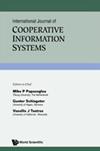Application of Financial Big Data Analysis Method Based on Collaborative Filtering Algorithm in Supply Chain Enterprises
IF 0.8
4区 计算机科学
Q4 COMPUTER SCIENCE, INFORMATION SYSTEMS
International Journal of Cooperative Information Systems
Pub Date : 2023-09-27
DOI:10.1142/s0218843023500223
引用次数: 0
Abstract
At present, the financial situation of China’s supply chain finance is still relatively unstable, and there are still some problems between supply chain enterprises and banks such as asymmetric information, insufficient model innovation and high operational risks. Based on this, this paper proposes and constructs a risk control model of financial big data analysis based on collaborative filtering algorithm. The purpose of this study is to realize the resource integration of supply chain enterprises and optimize the logistics chain, financial chain and information chain through the analysis of financial big data based on collaborative filtering algorithm, provide quality services for supply chain enterprises and good support for solving the financing problems of small and medium-sized enterprises. In order to verify the feasibility of the model, an experimental analysis is carried out. The experimental results show that this model has good scalability and operability, and the algorithm itself also has good scalability. The results of empirical analysis further verify that the design method in this paper has a good recommendation effect in terms of matching degree and user satisfaction. Compared with other risk control models, it is more practical and feasible. This research has certain practical significance for the financial management of supply chain enterprises.基于协同过滤算法的金融大数据分析方法在供应链企业中的应用
目前,中国供应链金融的金融状况还比较不稳定,供应链企业与银行之间还存在信息不对称、模式创新不足、经营风险高等问题。在此基础上,本文提出并构建了基于协同过滤算法的金融大数据分析风险控制模型。本研究的目的是通过基于协同过滤算法的金融大数据分析,实现供应链企业的资源整合,优化物流链、金融链和信息链,为供应链企业提供优质服务,为解决中小企业融资问题提供良好支持。为了验证该模型的可行性,进行了实验分析。实验结果表明,该模型具有良好的可扩展性和可操作性,算法本身也具有良好的可扩展性。实证分析的结果进一步验证了本文设计方法在匹配度和用户满意度方面具有良好的推荐效果。与其他风险控制模型相比,更具有实用性和可行性。本研究对供应链企业的财务管理具有一定的现实意义。
本文章由计算机程序翻译,如有差异,请以英文原文为准。
求助全文
约1分钟内获得全文
求助全文
来源期刊

International Journal of Cooperative Information Systems
工程技术-计算机:信息系统
CiteScore
2.30
自引率
0.00%
发文量
8
审稿时长
>12 weeks
期刊介绍:
The paradigm for the next generation of information systems (ISs) will involve large numbers of ISs distributed over large, complex computer/communication networks. Such ISs will manage or have access to large amounts of information and computing services and will interoperate as required. These support individual or collaborative human work. Communication among component systems will be done using protocols that range from conventional ones to those based on distributed AI. We call such next generation ISs Cooperative Information Systems (CIS).
The International Journal of Cooperative Information Systems (IJCIS) addresses the intricacies of cooperative work in the framework of distributed interoperable information systems. It provides a forum for the presentation and dissemination of research covering all aspects of CIS design, requirements, functionality, implementation, deployment, and evolution.
 求助内容:
求助内容: 应助结果提醒方式:
应助结果提醒方式:


